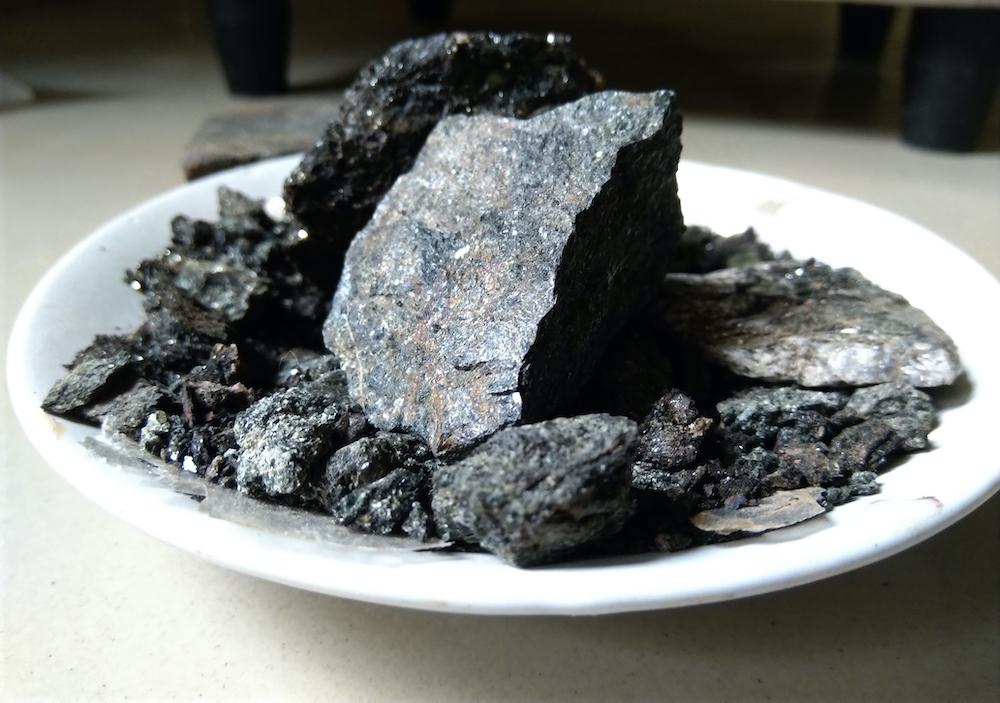Naturally-Occurring Shilajit May Have Unique Health Benefits For Women
Used in Ayurvedic medicine as a cure-all, this natural supplement is catching on in the U.S. for its alleged anti-aging properties.
Published Feb. 29 2024, 4:48 p.m. ET

There are many natural supplements and substances on the market today touting a myriad of health benefits. One such substance, shilajit, has a long history in Ayurvedic medicine, and has allegedly helped to improve everything from altitude sickness to sexual health. Harvesting shilajit for medicinal use is no easy task: It involves climbing steep mountain cliffs to 12,000 feet and collecting the deposits by hand.
Shilajit has been in use for over 4,000 years, and lately, it's been catching on even more among those seeking all-natural alternatives to traditional medical treatments. Although research is still in its infancy, there have been some positive, hopeful results about how it can improve overall health as well as specific conditions, including studies on shilajit’s benefits for women. So what is this mysterious substance, and what research has been done so far about its effectiveness?
Read on to learn all about shilajit and its potential benefits. That said, keep in mind that this article is not medical advice, and you should consult with a doctor before trying anything like shilajit.

What is shilajit?
According to Science Direct, shilajit is a brownish-black, sticky substance that’s found in sedimentary rocks. Although shilajit is naturally occurring across the globe, the highest concentrations are found in the Himalayas. Composed of rock humus, minerals, and organic materials, shilajit has been used for centuries in Ayurvedic medicine as a cure-all. Shilajit contains 15 to 20 percent fulvic acid, per Healthline, which is believed to be at the root of much of the substance's claimed health benefits.
Allegedly, shilajit is reported to improve problems with arthritis, aging and cognitive functions, cholesterol, infertility, liver cancer, and many other ailments, per Healthline; it has also been said to help improve libido, gut health, and overall energy. Some studies note shilajit's viability in the field of Alzheimer's research, while other studies have explored its potential for the prevention and treatment of viral infections, including HIV.

However, research on shilajit's effectiveness as a treatment for various medical conditions is extremely limited and preliminary, and the FDA has not approved the use of shilajit. The government agency has also issued advisory and warning letters to companies that sell shilajit products using unsupported marketing claims about its performance as a medicine. That said, the handful of studies that have been conducted are showing promising results, including some encouraging research for women.
Benefits of shilajit for women:
Shilajit has also allegedly shown positive impacts specifically on women’s health, including:
- Bone Loss: A 2022 study conducted on 60 postmenopausal women with osteopenia (a loss of bone marrow density that causes brittle bones that break easily), found that shilajit could potentialy discourage bone loss and reduce oxidative stress and inflammation.
- Reproduction: A 2023 study on 48 reproductive-aged women taking shilajit tablets found that it may improve sexual function, while a 2010 study on 60 infertile males found increases in sperm levels and serum testosterone levels in 28 of the participants.
- Skin Care: A clinical trial for a patented version of shilajit extract on healthy adult females found improvements in skin perfusion, indicating that it could have anti-aging benefits on the skin.
- Hair Loss: Another study with a different proprietary shilajit supplement showed potential for women suffering from hair loss to regrow hair in as little as three months. It also demonstrated that the average number of hairs in the target area on the scalp more than doubled after six months.

What are the potential side effects of shilajit?
Overall, current studies done on purified, ready-to-use shilajit have found it to be safe for use without dangerous side effects; however, there hasn’t been enough research to definitively say that it is entirely safe. Again, it's important to speak with a healthcare provider before considering the use of shilajit, in case an allergic reaction or other unexpected problems occur.
When should you avoid taking shilajit?
Since it has not been widely studied (yet), children and pregnant or breastfeeding people should avoid taking shilajit, per Verywell Health. Studies also warn that shilajit in its raw form poses health risks because of the presence of heavy metal ions, mycotoxins (a naturally occurring toxin found in fungi), free radicals, and other substances.